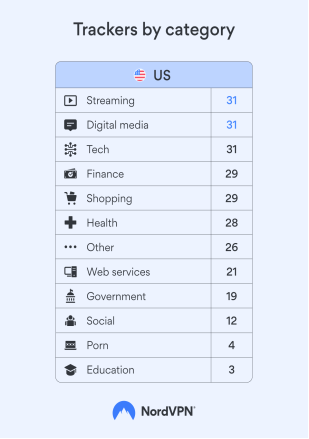Websites in the US have 23 trackers on average, which can collect and monetize their data
The newest research by cybersecurity company NordVPN shows that American websites have 23 trackers on average. This is the third biggest result out of the 25 countries studied. Streaming, tech, and digital media websites in the US have even more — 31 trackers on average.
Finance and shopping sites come into joint fourth place with an average of 29 trackers. Next, come health websites with 28 trackers per website. Porn and education websites are found to have the lowest degree of tracking, with four and three trackers, respectively, per website.
“The number of website trackers depends mostly on data-protection laws in a country. That is why in Central and Northern Europe, where GDPR rules are applied, websites have fewer trackers than in the US. In the US, no singular law covers the privacy of all types of data in all states,” says Daniel Markuson, a digital privacy expert at NordVPN.
Researchers looked into the 100 most popular websites in 25 countries around the world. Using three different tracker blockers, they could see how many trackers (such as a cookie or a tracking pixel) those websites use to know more about their users.
Why are trackers dangerous for Americans?
Trackers are usually inserted into the code of websites and are difficult to detect for a regular user. The kinds of information trackers collect can include IP address and location, browsing history, a user’s clicks on a website, and what items they looked at and for how long as well as the data about the browser and device they’re using.
Trackers can help website admins improve users’ experience after analyzing how visitors interact with their website.
On the other hand, this information helps to create a user’s profile sold to third parties. They use the profile to serve more targeted and intrusive ads that follow users from website to website.
“The worst case scenario is if cybercriminals get their hands on this data. They could compile a detailed portfolio about someone and use it against them in a phishing attack by crafting a highly personalized and believable message,” says Daniel Markuson.
How to avoid tracking
According to a survey by NordVPN, 46% of Americans worry about being tracked by social media giants (like Facebook), 40% are concerned that their data is collected by information and advertising aggregators (like Google), and 33% don’t want marketing agencies to get hold of their data.
Below, Daniel Markuson lists a number of ways users can become less trackable online:
- Use a VPN. By using a VPN, you will hide your real IP address and location from all third parties, including your ISP, cybercriminals, network administrators, and advertisers.
- Install tracker blocker. These stop your browser from collecting information about you and may also work as an ad blocker. Some tracker blockers, like NordVPN’s Threat Protection, offer other cybersecurity features, like malware protection.
- Use privacy browsers. Get an internet browser specifically tailored for people with online privacy in mind: no auto-syncing, no spell-check, no auto-fill, and no plug-ins.
- Ditch Google. Google tracks a lot of data about you — if you want to avoid that, you’ll have to opt for other email providers and search engines.
The methodology of the research can be found here: https://nordvpn.com/blog/nordvpn-research-website-trackers/
ABOUT NORDVPN
NordVPN is the world’s most advanced VPN service provider, used by millions of internet users worldwide. NordVPN provides double VPN encryption and Onion Over VPN and guarantees privacy with zero tracking. One of the key features of the product is Threat Protection, which blocks malicious websites, malware, trackers, and ads. NordVPN is very user friendly, offers one of the best prices on the market, and has over 5,000 servers in 60 countries worldwide. For more information: nordvpn.com









